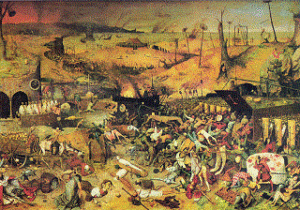
Arquivo para February 10th, 2022
Hunger, pandemics and wars
Great periods of famine in antiquity were due to wars of conquest and pillage, the Babylonian, Assyrian period, then the Persians and Greeks and finally the Roman Empire, followed by the period of the Huns and the barbarians of Northern Europe.
and pillage, the Babylonian, Assyrian period, then the Persians and Greeks and finally the Roman Empire, followed by the period of the Huns and the barbarians of Northern Europe.
The famine in this period was mainly due to looting and the transformation of the dominated peoples into slaves, in Greek Antiquity the idea of the State (city-states) is thought for the first time, but there were still slaves and in the population there was the social difference of the commoners, it was necessary to be “educated” as a citizen and there was no lack of virtues and a certain religiosity.
Also in the Bible history, many facts have been historically proven, a large number of wars, plagues and famine are narrated, especially in the period of Egyptian domination, it is estimated that the period of the flight of the Hebrew people from Egypt took place around 1391 to 1271, other historians suggest 1592 (Jerome) and James Ussher suggested 1571 as an early period.
In this period the famous 10 plagues would have happened and carrying followed by famine in that region, there are many controversies about this story.
The first great famine due to social and climatic crises was dated from 1315-1322 which hit almost all of Europe, a year of a bad spring in 1315, followed by two years of severe drought and heat, in this period there is a great number of wars when kingdoms and grand duchies were established, but then followed the period of the Black Plague (or bubonic) from 1347 to 1351, where it is estimated that 75 to 200 million people died (Table by (Peter Bruegel “The Triumph of Death”, 1562).
A period of famine also happened in Ireland in the period from 1849 to 1852 due to a fungus that annihilated the potato plantation, where food was quite dependent on this product, faced hunger, mortality and a 25% reduction of the population by death. or immigration.
The period of the Civil War from 1861 to 1865, basically for the defense of slavery to keep the south and part of the east in an agrarian model, for the north and west more industrial and that followed a period of industrialization and that makes the States States to emerge as an industrial power in the following period.
Europe in this period kept almost all of Africa (except Liberia and Ethiopia) almost entirely in a colonial model, despite this, at the beginning of the century, a cycle of financial crisis begins and the overcoming of the agrarian model and overcoming the nationalist period with many countries, in especially France, the United Kingdom and Russia with expansionist desires and the fall of the so-called Austro-Hungarian Empire.
Following this period in which the First World War broke out with more than 10 million deaths, the period of the Spanish flu and strong migrations of rural populations to Africa and Latin America, Brazil received, in addition to Italian, German and Spanish, also small populations of Ukraine, Poland and even Japanese.
The financial failure and the bad solution of the first war, in the Versailles treaties were the ferment for the second world war, the famine in Ukraine in the Stalinist period was made in this week’s post and the hunger that remains on the African continent is made in yesterday’s post .

